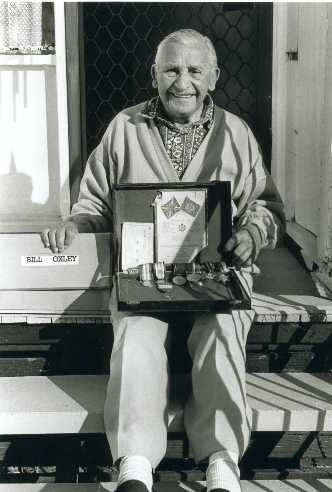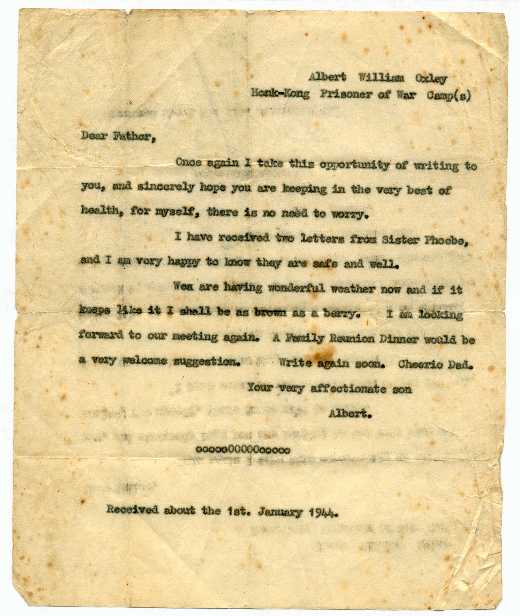William ('Bill') Oxley
Private 6723246 2nd Battalion Middlesex Regiment
Japanese P.O.W.
 Bill Oxley was my Great Uncle, the brother of my
paternal Grandmother. He joined the Middlesex Regiment as a regular soldier during
the depression of the early 1930's as it was the only work he could get.. In 1934 he
was posted to Egypt and then onward to Singapore where he enjoyed life as company clerk,
worked in the officers mess, tended to the regimental silver and immersed himself in all
the sport available. In 1937 when the Japanese invaded China the battalion were
ordered to Shanghai. They had only reached Hong Kong before being ordered to 'stay
put' after the news reached them that the Japanese were already entering Shanghai.
The battalion were ordered into the trenches in the New Territories to face the expected
invasion which never came. Thousands of Chinese trying to cross the border had to be
disarmed and turned back. Life slowly quitened down again and some of the old
routine returned to the activities of the Officers Mess and the sportsfield. The
battalion was now a machine gun battalion and over 50 Vickers machine guns were arranged
to cover the borders. Two battalions of Canadian troops also arrived as
reinforcements.. As the world war developed and Japan entered with the bombing of
Pearl Harbour the Middlesex Regiment busied themselves filling machine gun belts with
ammunition.
Bill Oxley was my Great Uncle, the brother of my
paternal Grandmother. He joined the Middlesex Regiment as a regular soldier during
the depression of the early 1930's as it was the only work he could get.. In 1934 he
was posted to Egypt and then onward to Singapore where he enjoyed life as company clerk,
worked in the officers mess, tended to the regimental silver and immersed himself in all
the sport available. In 1937 when the Japanese invaded China the battalion were
ordered to Shanghai. They had only reached Hong Kong before being ordered to 'stay
put' after the news reached them that the Japanese were already entering Shanghai.
The battalion were ordered into the trenches in the New Territories to face the expected
invasion which never came. Thousands of Chinese trying to cross the border had to be
disarmed and turned back. Life slowly quitened down again and some of the old
routine returned to the activities of the Officers Mess and the sportsfield. The
battalion was now a machine gun battalion and over 50 Vickers machine guns were arranged
to cover the borders. Two battalions of Canadian troops also arrived as
reinforcements.. As the world war developed and Japan entered with the bombing of
Pearl Harbour the Middlesex Regiment busied themselves filling machine gun belts with
ammunition.
By the time of the Japanese invasion Bill
was a bandsman, a drummer and was supposed to form a party of stretcher bearers. The
bandsmen joined Hong Kong volunteers and Bill lead a group armed with a Lewis Gun.
They were positioned on the race course in Happy Valley with a tripod mounting to take up
an anti aircraft role. They spent four days fending off low flying Japanese aircraft
claiming at least one 'kill' before Bill was hit in the shoulder. Bill was in
hospital at St Stephens college when it was overun by Japanese and he witnessed some
atrocities at first hand. He was taken prisoner and suffered deprivations of periods
without food and water and of forced labour building airstrips for the Japanese. He
also witnessed a full parade of prisoners who were threatened at the point of machine guns
to sign agreements not to attempt escape. These were refused but the stand off
bought repurcussions, beatings and executions. Perversely it was allied bombing
raids that so nearly caused their own deaths that helped to lift the prisoners morale as
they felt it showed that they were not forgotten and their captors were being hit back.
After suffering from dysentry and watching many die from diptheria Bill was
eventually loaded aboard the ship the Assama Maru, a coal carrier, and transported to
mainland Japan

Here the treatment was little better and the
prisoners were used as forced labour in the coal mines until they were abandoned
underground shortly after the dropping of the atomic bomb. They dared not leave
their alloted work place for fear of beatings, but at the same time they feraed thay had
been buried and abandoned by their guards. They waited 18 hours below ground before
daring to venture out to investigate where all the guards had gone. Unbelievable as
it may seem, abandoned in the camp they threw their lot in with the local civilian
population and shared what little food they had between them. The Japanese women
laboured to recover the crates of food dropped by allied bombers once the prison camp had
been identified by large P.O.W. signs painted across the roof. The crates sunk in
the paddy fields and required large teams of women to recover them as the prisoners
themselves were too weak. Bill eventually reached Britain again following a
long slow journey via Hawai and Canada. Perhaps the time taken on this slow route
was not only for the benefit of the POW's, but also, in their fattened and healthier
state, leesened the shock of the British public as to what had really happened to their
prisoners in the East.
Under the circumstances Bills letter home to
his father, shown right, and presumably delivered via the red cross seems unbelievably
optimistic judging by what we now know about the conditions for Japanese POWs. It
must have been heavily censored, or else, more probably, Bill was putting on an extremely
brave face to spare his family from the truth.
Bill never really settled down and spent his
time always on the move, from house to house and twice emigrated to Australia. He
returned to Hong Kong 53 years later to put some ghosts to rest. It was around 1992
that I met him properley for the first time. A sprightly man in his late 70's who looked
an ex army type simply from his neatness. He wanted to visit some old pals at the
Middlesex Regiment Alms houses in Enfield Middlesex, so I drove him over there and
arranged to collect him a few hours later. On my return to collect him I was
welcomed in and plied with whisky on the basis that I was related to 'Bill'. There
were several old men in their seventies talking as if the war was yesterday and they had
never been apart. They also talked about those who didn't come back and those who
had been beaten or murdered over things as trivial as a stolen cigarette. There were
some long pauses. It was only later that I realised the significance of those people
I met that day.
For further information take a look at Tony Banhams excellent web site about the Battle
of Hong Kong and for information on his book on the subject "Not the slightest
chance". The site contains a full listing of all the Hong Kong defenders,
British, Canadian and Native.
www.hongkongwardiary.com
Return to Favell
family history WW2
 Bill Oxley was my Great Uncle, the brother of my
paternal Grandmother. He joined the Middlesex Regiment as a regular soldier during
the depression of the early 1930's as it was the only work he could get.. In 1934 he
was posted to Egypt and then onward to Singapore where he enjoyed life as company clerk,
worked in the officers mess, tended to the regimental silver and immersed himself in all
the sport available. In 1937 when the Japanese invaded China the battalion were
ordered to Shanghai. They had only reached Hong Kong before being ordered to 'stay
put' after the news reached them that the Japanese were already entering Shanghai.
The battalion were ordered into the trenches in the New Territories to face the expected
invasion which never came. Thousands of Chinese trying to cross the border had to be
disarmed and turned back. Life slowly quitened down again and some of the old
routine returned to the activities of the Officers Mess and the sportsfield. The
battalion was now a machine gun battalion and over 50 Vickers machine guns were arranged
to cover the borders. Two battalions of Canadian troops also arrived as
reinforcements.. As the world war developed and Japan entered with the bombing of
Pearl Harbour the Middlesex Regiment busied themselves filling machine gun belts with
ammunition.
Bill Oxley was my Great Uncle, the brother of my
paternal Grandmother. He joined the Middlesex Regiment as a regular soldier during
the depression of the early 1930's as it was the only work he could get.. In 1934 he
was posted to Egypt and then onward to Singapore where he enjoyed life as company clerk,
worked in the officers mess, tended to the regimental silver and immersed himself in all
the sport available. In 1937 when the Japanese invaded China the battalion were
ordered to Shanghai. They had only reached Hong Kong before being ordered to 'stay
put' after the news reached them that the Japanese were already entering Shanghai.
The battalion were ordered into the trenches in the New Territories to face the expected
invasion which never came. Thousands of Chinese trying to cross the border had to be
disarmed and turned back. Life slowly quitened down again and some of the old
routine returned to the activities of the Officers Mess and the sportsfield. The
battalion was now a machine gun battalion and over 50 Vickers machine guns were arranged
to cover the borders. Two battalions of Canadian troops also arrived as
reinforcements.. As the world war developed and Japan entered with the bombing of
Pearl Harbour the Middlesex Regiment busied themselves filling machine gun belts with
ammunition.